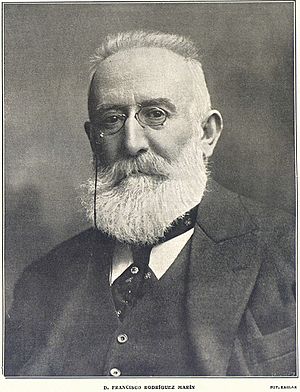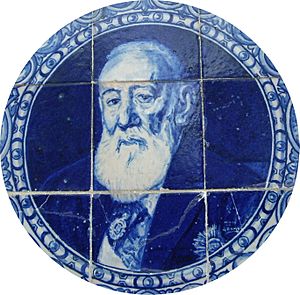Francisco Rodríguez Marín facts for kids
Quick facts for kids
The Most Excellent
Francisco Rodríguez Marín
|
|
|---|---|

Portrait by Kaulak published in La Esfera
|
|
| Born |
Francisco Rodríguez Marín
27 January 1855 |
| Died | 9 June 1943 (aged 88) Madrid, Spain
|
| Seat g of the Real Academia Española | |
| In office 27 de Octubre de 1907 – 9 June 1943 |
|
| Preceded by | Raimundo Fernández-Villaverde |
| Succeeded by | Esteban Terradas i Illa |
| Director of the Real Academia Española | |
| In office 5 December 1940 – 9 June 1943 |
|
| Preceded by | José María Pemán |
| Succeeded by | Miguel Asín Palacios |
Francisco Rodríguez Marín (born January 27, 1855, in Osuna, Spain – died June 9, 1943, in Madrid, Spain) was a famous Spanish poet. He was also known for studying proverbs (short, wise sayings) and words, like a dictionary expert.
Contents
Life and Work of Francisco Rodríguez Marín
Francisco Rodríguez Marín finished high school in his hometown of Osuna. Later, he studied law at the University of Seville. He became very interested in traditional Spanish folk songs. He even helped start a group called the "Sociedad del Folk-Lore Andaluz" in 1881. Here, he met other important scholars.
Early Career and Family Life
In 1883, Francisco returned to Osuna and worked as a lawyer. He married Dolores Vecino in 1885, and they had several children together. Besides his law work, he also wrote for newspapers and published his own poetry. In 1897, he had a throat operation and almost lost his voice. He wrote for a magazine in Seville and contributed to various local and national newspapers.
Focus on Literature and Academia
Francisco was especially interested in traditional Spanish literature, the works of Miguel de Cervantes (who wrote Don Quixote), and literature from the Andalusia region. In 1895, he met a famous scholar named Marcelino Menéndez Pelayo. Soon after, Francisco became a professor at the "Academia Sevillana de Buenas Letras." In 1897, he also became a city council member in Seville.
On October 27, 1907, he began teaching at the Real Academia Española (RAE). This is a very important institution that protects and guides the Spanish language. He also led the National Library of Madrid from 1912 to 1930.
Later Life and Legacy
In 1927, Francisco was chosen to teach at the Royal Academy of History. Sadly, his wife, Dolores Vecino, passed away in 1931. During the Spanish Civil War, he stayed for over two years in Piedrabuena, a town where his daughter Carlota lived. While there, he wrote a book called "En un lugar de La Mancha."
On December 5, 1940, he was appointed director of the Royal Spanish Academy, a very high honor. He continued in this role until he passed away in 1943.
Francisco Rodríguez Marín published several editions of Don Quixote, which are still well-known today. He also edited other works by Cervantes and collected many unpublished documents related to him. He put together many collections of Spanish songs and proverbs. As a poet, he wrote beautiful poems, including madrigals and sonnets, in a style similar to the Golden Age of Spanish literature. His poems were collected in books like "A la real de España." He also compiled letters he exchanged with his friend Marcelino Menéndez y Pelayo.
Images for kids
See also
 In Spanish: Francisco Rodríguez Marín para niños
In Spanish: Francisco Rodríguez Marín para niños



